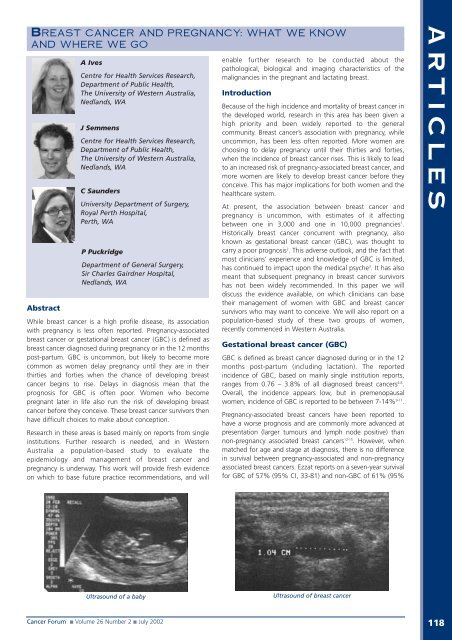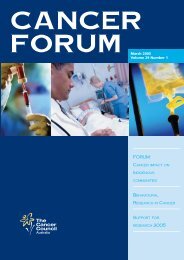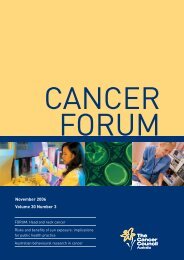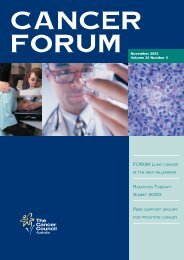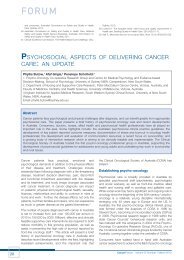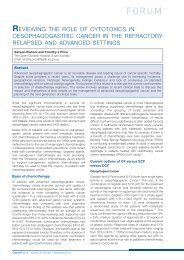Cancer Forum
Cancer Forum
Cancer Forum
- No tags were found...
You also want an ePaper? Increase the reach of your titles
YUMPU automatically turns print PDFs into web optimized ePapers that Google loves.
Breast cancer and pregnancy: What we knowand where we goAbstractA IvesCentre for Health Services Research,Department of Public Health,The University of Western Australia,Nedlands, WAJ SemmensCentre for Health Services Research,Department of Public Health,The University of Western Australia,Nedlands, WAC SaundersUniversity Department of Surgery,Royal Perth Hospital,Perth, WAP PuckridgeDepartment of General Surgery,Sir Charles Gairdner Hospital,Nedlands, WAWhile breast cancer is a high profile disease, its associationwith pregnancy is less often reported. Pregnancy-associatedbreast cancer or gestational breast cancer (GBC) is defined asbreast cancer diagnosed during pregnancy or in the 12 monthspost-partum. GBC is uncommon, but likely to become morecommon as women delay pregnancy until they are in theirthirties and forties when the chance of developing breastcancer begins to rise. Delays in diagnosis mean that theprognosis for GBC is often poor. Women who becomepregnant later in life also run the risk of developing breastcancer before they conceive. These breast cancer survivors thenhave difficult choices to make about conception.Research in these areas is based mainly on reports from singleinstitutions. Further research is needed, and in WesternAustralia a population-based study to evaluate theepidemiology and management of breast cancer andpregnancy is underway. This work will provide fresh evidenceon which to base future practice recommendations, and willenable further research to be conducted about thepathological, biological and imaging characteristics of themalignancies in the pregnant and lactating breast.IntroductionBecause of the high incidence and mortality of breast cancer inthe developed world, research in this area has been given ahigh priority and been widely reported to the generalcommunity. Breast cancer’s association with pregnancy, whileuncommon, has been less often reported. More women arechoosing to delay pregnancy until their thirties and forties,when the incidence of breast cancer rises. This is likely to leadto an increased risk of pregnancy-associated breast cancer, andmore women are likely to develop breast cancer before theyconceive. This has major implications for both women and thehealthcare system.At present, the association between breast cancer andpregnancy is uncommon, with estimates of it affectingbetween one in 3,000 and one in 10,000 pregnancies 1 .Historically breast cancer concurrent with pregnancy, alsoknown as gestational breast cancer (GBC), was thought tocarry a poor prognosis 2 . This adverse outlook, and the fact thatmost clinicians’ experience and knowledge of GBC is limited,has continued to impact upon the medical psyche 3 . It has alsomeant that subsequent pregnancy in breast cancer survivorshas not been widely recommended. In this paper we willdiscuss the evidence available, on which clinicians can basetheir management of women with GBC and breast cancersurvivors who may want to conceive. We will also report on apopulation-based study of these two groups of women,recently commenced in Western Australia.Gestational breast cancer (GBC)GBC is defined as breast cancer diagnosed during or in the 12months post-partum (including lactation). The reportedincidence of GBC, based on mainly single institution reports,ranges from 0.76 – 3.8% of all diagnosed breast cancers 4-8 .Overall, the incidence appears low, but in premenopausalwomen, incidence of GBC is reported to be between 7-14% 9-11 .Pregnancy-associated breast cancers have been reported tohave a worse prognosis and are commonly more advanced atpresentation (larger tumours and lymph node positive) thannon-pregnancy associated breast cancers 12-15 . However, whenmatched for age and stage at diagnosis, there is no differencein survival between pregnancy-associated and non-pregnancyassociated breast cancers. Ezzat reports on a seven-year survivalfor GBC of 57% (95% CI, 33-81) and non-GBC of 61% (95%ARTICLESUltrasound of a babyUltrasound of breast cancer<strong>Cancer</strong> <strong>Forum</strong> ■ Volume 26 Number 2 ■ July 2002118


